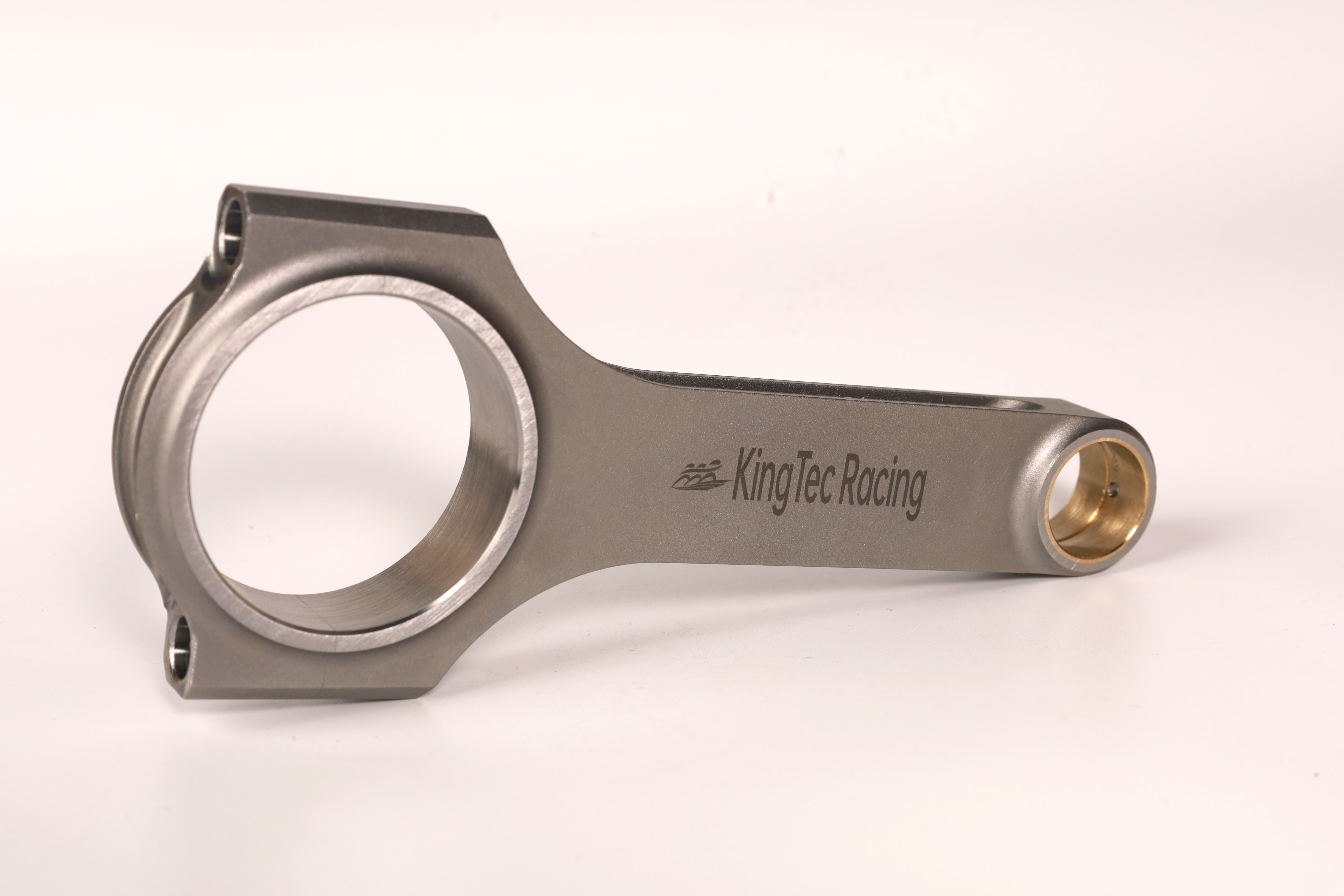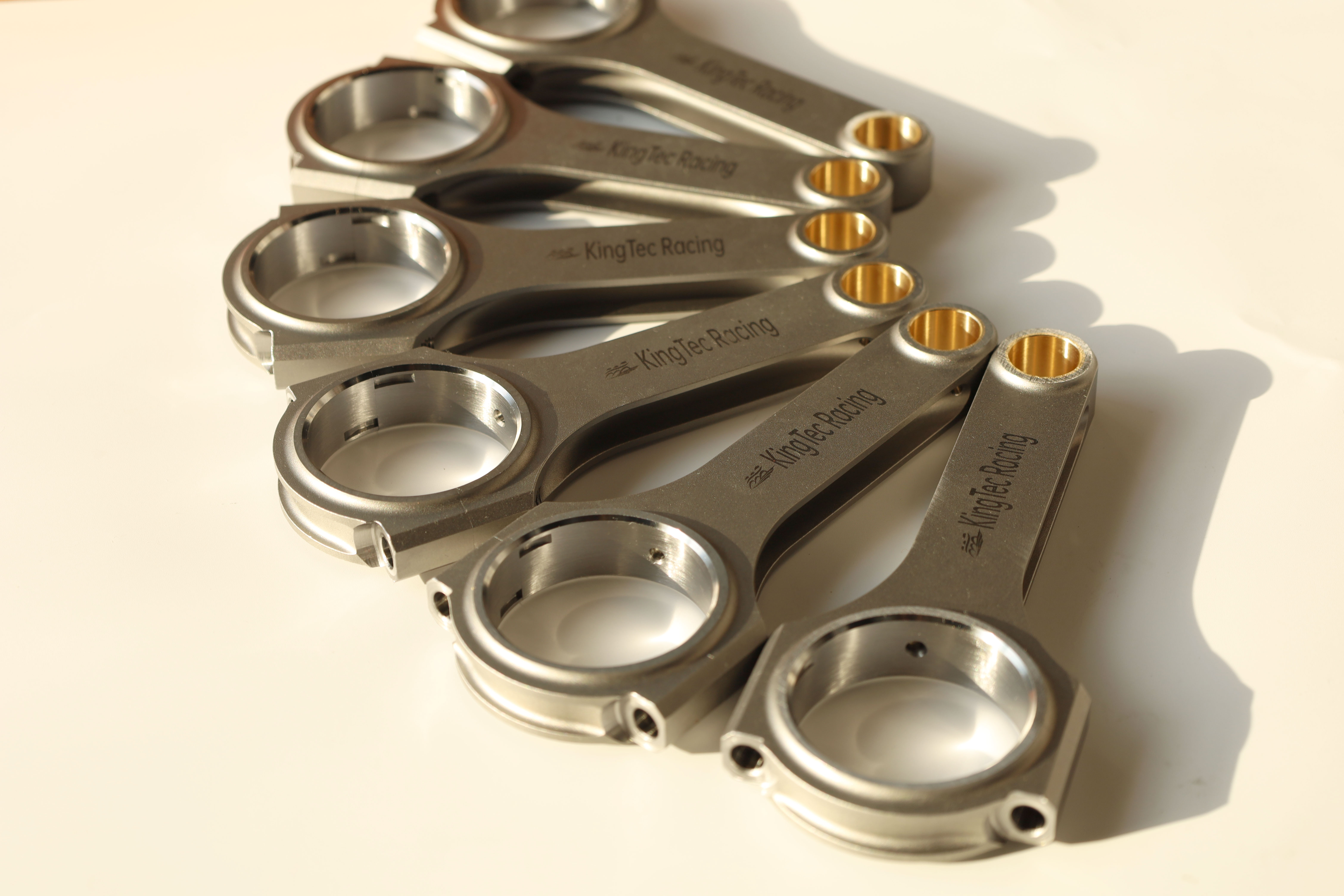Steel vs Aluminum vs Titanium connecting rods, how to choose the right forged connecting rod?
By KingTec Racing
August 22nd, 2023
When it comes to building a high-performance engine, every component matters, and connecting rods play a pivotal role in the engine's overall performance and reliability. Selecting the right set of connecting rods is a crucial step that can greatly influence the engine's power output, durability, and cost-effectiveness. In this article, we'll delve into the world of connecting rods, specifically focusing on the three main contenders: steel, aluminum, and titanium. By understanding the characteristics and advantages of each type, you can make an informed decision on which forged connecting rod is best suited for your engine build.
The Importance of Choosing the Right Connecting Rods
Connecting rods are tasked with transmitting the energy generated by the combustion process to the crankshaft, converting it into rotational motion. This makes them a critical component in any performance engine, as they must withstand high forces, stresses, and speeds without compromising structural integrity. For engines producing power beyond the capabilities of stock rods, upgrading to performance-grade connecting rods becomes essential.
 Forged Steel Connecting Rods: The Standard of Racing
Forged steel connecting rods have long been the backbone of high-performance engines. Constructed from 4340 forged steel, these rods offer exceptional strength and durability. Various heat treatments can be applied to enhance their properties, such as stress relief and hardening. Shot peening, a process that bombards the surface of the rod with tiny particles, further enhances stress relief and strengthens the outer layer of metal. Heat treatments like nitrogen diffusion can also be employed for an even stronger finish.
Micro-polishing treatments not only contribute to the rod's durability but also provide an aesthetically pleasing appearance. Forged steel rods strike a balance between affordability and performance, making them a popular choice for a wide range of applications.
Aluminum Connecting Rods: Lightness and Agility
Aluminum connecting rods offer a distinct advantage in terms of weight reduction. This reduction in weight allows the engine to rev faster, resulting in crisper throttle response. To maintain the necessary strength, aluminum rods are typically thicker than their steel counterparts. A comparison between a standard 5.7 Chevy small block steel rod and an equivalent aluminum rod reveals a substantial weight difference. While a steel rod might weigh around 600 grams, an aluminum rod could weigh between 445 to 530 grams, depending on the alloy used.
The lightweight nature of aluminum rods makes them particularly well-suited for applications where weight reduction is paramount, such as professional drag racing.
Titanium Connecting Rods: The Epitome of Performance
For those seeking the pinnacle of performance, titanium connecting rods are the ultimate choice. Titanium rods are approximately 30 percent lighter than their steel counterparts, offering unparalleled responsiveness. This reduced weight allows the engine to reach higher RPMs with minimized reciprocal loading on the crankshaft.
However, the use of titanium comes with its challenges. Titanium is notoriously difficult to machine, making the manufacturing process more complex and time-consuming. Additionally, the higher market price of titanium as a raw material translates to a significantly higher cost for a set of titanium rods. In fact, the price tag for titanium rods can be four to five times that of a set of steel racing rods.
Forged Steel Connecting Rods: The Standard of Racing
Forged steel connecting rods have long been the backbone of high-performance engines. Constructed from 4340 forged steel, these rods offer exceptional strength and durability. Various heat treatments can be applied to enhance their properties, such as stress relief and hardening. Shot peening, a process that bombards the surface of the rod with tiny particles, further enhances stress relief and strengthens the outer layer of metal. Heat treatments like nitrogen diffusion can also be employed for an even stronger finish.
Micro-polishing treatments not only contribute to the rod's durability but also provide an aesthetically pleasing appearance. Forged steel rods strike a balance between affordability and performance, making them a popular choice for a wide range of applications.
Aluminum Connecting Rods: Lightness and Agility
Aluminum connecting rods offer a distinct advantage in terms of weight reduction. This reduction in weight allows the engine to rev faster, resulting in crisper throttle response. To maintain the necessary strength, aluminum rods are typically thicker than their steel counterparts. A comparison between a standard 5.7 Chevy small block steel rod and an equivalent aluminum rod reveals a substantial weight difference. While a steel rod might weigh around 600 grams, an aluminum rod could weigh between 445 to 530 grams, depending on the alloy used.
The lightweight nature of aluminum rods makes them particularly well-suited for applications where weight reduction is paramount, such as professional drag racing.
Titanium Connecting Rods: The Epitome of Performance
For those seeking the pinnacle of performance, titanium connecting rods are the ultimate choice. Titanium rods are approximately 30 percent lighter than their steel counterparts, offering unparalleled responsiveness. This reduced weight allows the engine to reach higher RPMs with minimized reciprocal loading on the crankshaft.
However, the use of titanium comes with its challenges. Titanium is notoriously difficult to machine, making the manufacturing process more complex and time-consuming. Additionally, the higher market price of titanium as a raw material translates to a significantly higher cost for a set of titanium rods. In fact, the price tag for titanium rods can be four to five times that of a set of steel racing rods.
 Making the Right Choice
If you're aiming for a balance between performance and affordability, forged steel connecting rods are a solid choice. They offer durability, strength, and cost-effectiveness, making them suitable for a wide range of applications.
For those seeking improved agility and throttle response, aluminum connecting rods provide a lightweight alternative. Their reduced weight can make a noticeable difference in engine performance, especially in applications where rapid acceleration is crucial.
For the enthusiasts who demand the absolute best in performance and are willing to invest, titanium connecting rods offer unmatched lightness and responsiveness. However, the higher cost and manufacturing complexities associated with titanium should be carefully considered.
In short, the choice between steel, aluminum, and titanium connecting rods depends on your specific goals and constraints. Whether you're pursuing a well-rounded performance, lightweight agility, or the highest levels of power, each type of connecting rod has its own set of advantages to offer. As you embark on your engine-building journey, remember that selecting the right connecting rods is a significant step toward achieving the performance and reliability you desire.
Making the Right Choice
If you're aiming for a balance between performance and affordability, forged steel connecting rods are a solid choice. They offer durability, strength, and cost-effectiveness, making them suitable for a wide range of applications.
For those seeking improved agility and throttle response, aluminum connecting rods provide a lightweight alternative. Their reduced weight can make a noticeable difference in engine performance, especially in applications where rapid acceleration is crucial.
For the enthusiasts who demand the absolute best in performance and are willing to invest, titanium connecting rods offer unmatched lightness and responsiveness. However, the higher cost and manufacturing complexities associated with titanium should be carefully considered.
In short, the choice between steel, aluminum, and titanium connecting rods depends on your specific goals and constraints. Whether you're pursuing a well-rounded performance, lightweight agility, or the highest levels of power, each type of connecting rod has its own set of advantages to offer. As you embark on your engine-building journey, remember that selecting the right connecting rods is a significant step toward achieving the performance and reliability you desire.
If you're still unsure about which type of connecting rod is best suited for your engine build, our team at KingTec Racing is here to help. With years of experience in the performance automotive industry, we understand the nuances of each type of connecting rod and can provide expert guidance tailored to your unique requirements. Feel free to contact us to discuss your project, ask questions, or receive personalized recommendations. Your engine's success is our passion, and we look forward to being part of your high-performance journey.
Previous
Forged Piston Manufacturer Face-Off:Who makes the best forged pistons?
Read More
Next
A Basic Guide to Forged Crankshaft
Read More


